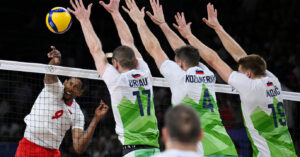By Beatriz Marie D. Cruz, Reporter
THE hosting of international sporting events is expected to unlock growth opportunities for the tourism and retail industries sectors, analysts said.
“Business in the Philippines should understand that sports is important for their business. It promotes their product well, and it gives them a good brand image because volleyball is a family and entertainment (sport),” Philippine National Volleyball Federation (PNVF) President Ramon Suzara said in a briefing last week.
The Philippines will be hosting the 2025 FIVB Volleyball Men’s World Championship between Sept. 12 and 28. Games will be held at the SM Mall of Asia Arena in Pasay City and the Smart Araneta Coliseum in Quezon City.
The tournament is held every two years, following the new streamlined elite calendar to identify which teams qualify for the Olympics.
A total of 32 national teams will join the tournament — the Philippines, Iran, Egypt, Tunisia, the US, Cuba, Portugal, Colombia, Slovenia, Germany, Bulgaria, Chile, Brazil, Serbia, Czechia, China, Poland, the Netherlands, Qatar, Romania, France, Argentina, Finland, South Korea, Italy, Ukraine, Belgium, Algeria, Japan, Canada, Turkey, and Libya.
“We expect to have P500 million and up of income (from the tournament)” he told reporters.
The 2022 Volleyball World Championships attracted 426,000 spectators, with the economic impact for host countries Poland and Slovenia estimated at 39.4 million euros, including accommodations, travel, food & beverage, retail, and tourism.
Around 57% of Volleyball World Championship fans identify as high-income earners, and about 54% of tourists said they are likely to return for future tournaments.
The Philippine sports market is estimated at $158.1 million (around P9.24 billion) this year, according to German online data platform Statista.
To run the event, PNVF is looking to raise at least P1 billion from the private sector, Mr. Suzara said.
Hosting international sporting events will help increase spending in the local retail and hospitality sectors, according to property consultancy Colliers Philippines.
“The hosting should also enable the country to see a spike in foreign tourists and domestic travelers during the (third quarter),” Colliers Philippines Associate Director Joey Roi Bondoc said in an e-mail.
“With the events lasting more than two weeks, this should entice foreign tourists to stay longer in hotels and spend more,” Mr. Bondoc added.
Hotels are also expected to improve their food offerings and facilities to cater to athletes and tourists, Mr. Suzara said.
The event is expected to increase retail spending, especially with the recently implemented value-added tax refund for international tourists, said Philippine Retailers Association President Roberto S. Claudio.
Both the government and the private sector must work to ensure the seamless entry of foreign visitors. This would entice more global organizations to stage high-profile events in the Philippines, Mr. Bondoc said.
“This is crucial especially as the Philippines is being positioned as a meetings, incentives, conferences, exhibitions (MICE) hub in Asia. Eventually, more high-profile events should entice private developers to build more MICE facilities and hotels in key destinations across the Philippines.”
Leonardo A. Lanzona, an economics professor at the Ateneo De Manila, said a developing country like the Philippines must ensure sufficient funding to ensure that hosting international sporting events does not result in significant losses.
He noted that the 1976 Montreal Olympics left the hosts with $1.6 billion Canadian dollars in debt, causing long-term financial strain for the country.
“To keep this from happening, the country needs to develop detailed and realistic budgets that account for all potential costs, including infrastructure, security, and operational expenses,” Mr. Lanzona said via Messenger.

